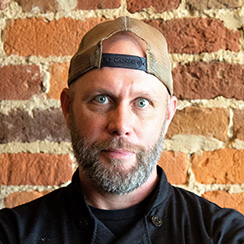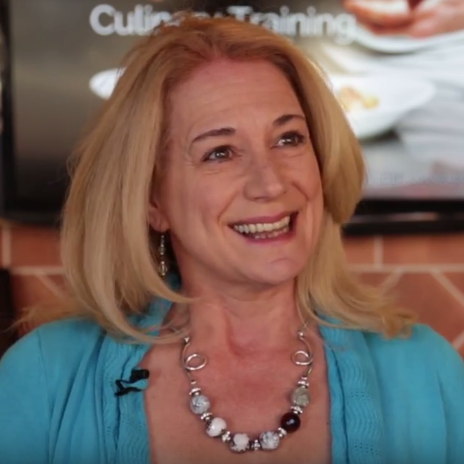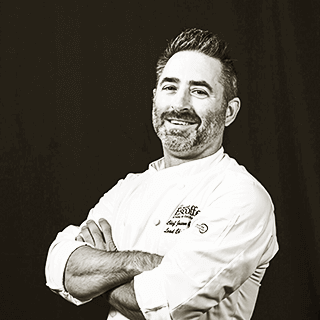Listen to This Article:
So you’ve put in countless hours as a line cook and now you’re ready to step into the role of “professional chef.” Chances are, you already know how to navigate a bustling kitchen and come to the table with a competitive skill set.
Along with demonstrating your rapid-fire technical skills–such as finely chopping an onion or preparing a decadent dinner course–you may need to first answer a wide range of questions that showcase the breadth of your experience. To get fully prepared, let’s unpack the top 10 chef interview questions hiring managers may ask.
Most Common Chef Interview Questions
Your interview as a chef will likely cover a broad range of questions that delve into your personality, educational background, technique, problem-solving skills, future aspirations, and more.

1. When Did You Want to Become a Chef?
This type of question might offer the hiring manager insight into your personal ambitions and track record. Although you don’t want to recite a 20-minute recollection of your past, be prepared by coming up with a 1-2 minute overview or “elevator pitch” of your culinary journey.
This might look like starting with that formative childhood moment cooking a nostalgic family recipe, enrolling in culinary school, and perhaps a few career milestones or accolades you’re most proud of.
2. Why Do You Want to Work at This Restaurant?
Just like any interview, a hiring manager may want to see that you’ve done your homework on the restaurant before the interview. A candidate who exudes passion for a restaurant’s ethos might set them apart from the rest of the competition.
When formulating your answer, think about the following:
- History regarding the restaurant’s owner
- Your dining experience at the restaurant
- Any menu items that stand out to you
- Any recent press about the restaurant
3. What Did Your Education and Hands-On Training Entail?
Many aspiring chefs will take this opportunity to highlight their formal culinary education and what type of curriculum they studied. For example, a student who graduated from an Escoffier culinary school program might elaborate on how their curriculum covered foodservice management, farm-to-table philosophies, purchasing and cost control, and more.
If you completed any industry externships, this is the time to discuss your experience! For example, hands-on externships are required at Escoffier and allow students to explore ancillary skills such as plating, ingredient sourcing, recipe development, and optimizing the guest experience.
“My education with Escoffier has really given me a good foundation. It has filled a resume gap; it’s filled a professional gap and a skills gap. It has helped me in all aspects of my culinary career.”*
Lance McWhorter, Executive Chef/Owner, Culture ETX; Food Network “Chopped” Contestant; Online Culinary Arts Graduate
4. How Would You Describe Your Overall Cooking Style?
Most likely, a hiring manager will want to discern whether your style matches the restaurant’s overall essence. Although it doesn’t have to align perfectly, this question offers insight into your personal approach as a chef.
For example, if you’re interviewing at a plant-based restaurant, the hiring manager will likely look for a sustainably-focused cooking style that’s grounded in farm-to-table principles. Your answer might also disclose whether you keep up with modern cooking trends, your preferred cuisine style, and perhaps a few signature dishes.
5. What Can’t You Live Without in the Kitchen?
Most professional chefs can’t properly function in the kitchen without a coveted utility belt. This chef interview question is an opportunity to demonstrate your technical skills and also underscore your cooking style.
For example, your answer might be “Since I’m always cooking innovative, plant-based dishes, I can’t live without my sharp bench scraper.”
6. How Do You Conceptualize Menus?
As a chef, you might be expected to design restaurant menus to set the tone of the restaurant. This is a prime opportunity to elaborate on your strategy and touch on the following:
- Prioritizing menu items
- Choosing the right visuals
- Using seasonal items
- Preventing waste
- Cost control
7. How Do You Monitor the Quality of Dishes?
Most restaurants uphold quality control processes to ensure guest satisfaction. This is a critical skill professional chefs will likely need to monitor, so elaborate on what your own process looks like.
Perhaps you dive into your prior experience as a line chef and ways you ensured dishes reflected the restaurant’s overall standards. Your answer will also likely display your own attention to detail.
“[Escoffier graduates’] self-initiative—and their passion for providing quality food to our customers—allows us to put them into a leadership role very quickly.”*
Mary Ann Mathieu, Executive Recruiter, Sodexo
8. How Do You Manage Conflict Amongst Kitchen Staff?
Although there’s no “one size fits all” answer to this one, you may want to elaborate on your conflict-management process. Most likely, the hiring manager will be looking for empathy, diplomacy, and team-based communication.
Students who complete the Culinary Arts program at Escoffier can complete a culinary entrepreneurship course that covers topics around business ethics, management, and leadership.
9. How Do You Handle Not Ordering the Right Amount of Ingredients?
Not only is this a common problem-solving chef interview question, but it may also highlight your training in purchasing and cost control, which includes the basic food cost calculation.
You might want to elaborate on your personal procedure when variance figures are off, which may include how you handle food waste. For example, how did you modify your inventory management to ensure an accident like this didn’t occur again?
“We have courses that address food service math and accounting, cost control, purchasing, and food and beverage operations, among others. So we have multiple classes that cover different aspects of the financial piece of the hospitality industry.”*
Jason Goldman, Escoffier Chef Instructor, Pastry Arts and Hospitality & Restaurant Operations Management
10. What are Your Future Ambitions as a Professional Chef?
When it comes time to answer this question, be as candid as possible, and don’t hold back on your individual passions! Perhaps you see yourself as an acclaimed executive chef, cookbook author, or cooking contest competitor. Try your best to articulate your ideal vision and don’t forget to express gratitude for the opportunity to interview at the end.
Tips for a Successful Culinary Job Interview
Now that you know the top chef interview questions, here are some helpful tips to prepare you ahead of time.

- It’s normal to feel an outburst of nerves before interviewing for a chef position—especially if it’s at your “dream” restaurant. Hiring managers are usually well aware of this and will “set the tone” with a few icebreaker questions to get you warmed up and showcase your personality.
- As you prepare for this interview, carve out time to review the fundamental techniques, such as specific knife cuts you explored in culinary school. Dress to impress and always have your essentials handy, such as your knife kit and chef apron.
- You might get several problem-solving questions that require you to bring up “mistakes you previously made in the kitchen.” It’s likely the hiring manager will want to hear about your solution strategy, lessons learned, and ways to prevent that mistake from happening again. Don’t forget to end on a positive note!
- According to Omni Hotels & Resorts Executive Chef Josh Hasho, it’s likely the hiring manager or chef will also want to see you in your element as well. So it’s best to be prepared for a “staging,” or practical interview, following the interview questions.
- If you’re asked to prepare a series of dishes in the tasting interview, it might be best to stick with what you know and use ingredients that are familiar to you.
Prepare for Chef Interview Questions
Overall, hiring managers not only evaluate your technical skills, but they may also consider ambition, passion, coachability, personality type, and depth of knowledge. If you want to potentially become a high-quality candidate for a chef position, you can start by gaining valuable training at an accredited culinary school, such as Auguste Escoffier School of Culinary Arts.
To discover more about Escoffier’s culinary programs, contact us today to speak with our admissions department.
Was this article useful? Try these next:
- What Chefs Look For When Hiring Culinary School Graduates
- The Difference Between a Professional Cook and Chef
- What Culinary Training Do You Need for a Professional Cooking Career
*Information may not reflect every student’s experience. Results and outcomes may be based on several factors, such as geographical region or previous experience.

 “My education with Escoffier has really given me a good foundation. It has filled a resume gap; it’s filled a professional gap and a skills gap. It has helped me in all aspects of my culinary career.”*
“My education with Escoffier has really given me a good foundation. It has filled a resume gap; it’s filled a professional gap and a skills gap. It has helped me in all aspects of my culinary career.”* “[Escoffier graduates’] self-initiative—and their passion for providing quality food to our customers—allows us to put them into a leadership role very quickly.”*
“[Escoffier graduates’] self-initiative—and their passion for providing quality food to our customers—allows us to put them into a leadership role very quickly.”* “We have courses that address food service math and accounting, cost control, purchasing, and food and beverage operations, among others. So we have multiple classes that cover different aspects of the financial piece of the hospitality industry.”*
“We have courses that address food service math and accounting, cost control, purchasing, and food and beverage operations, among others. So we have multiple classes that cover different aspects of the financial piece of the hospitality industry.”*
